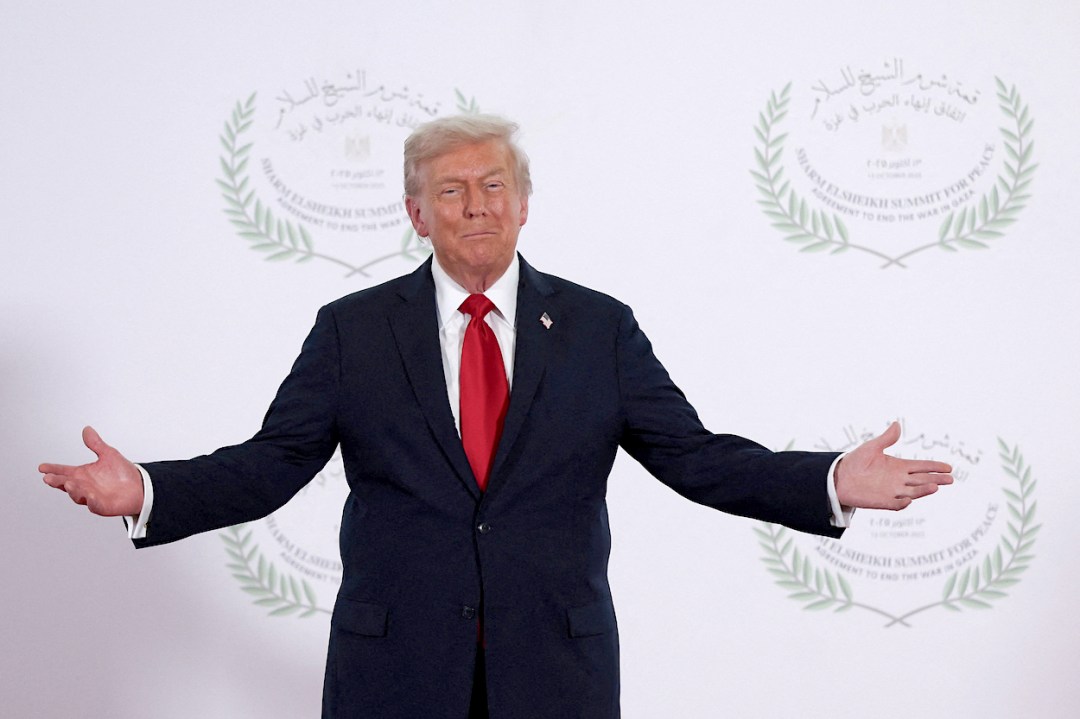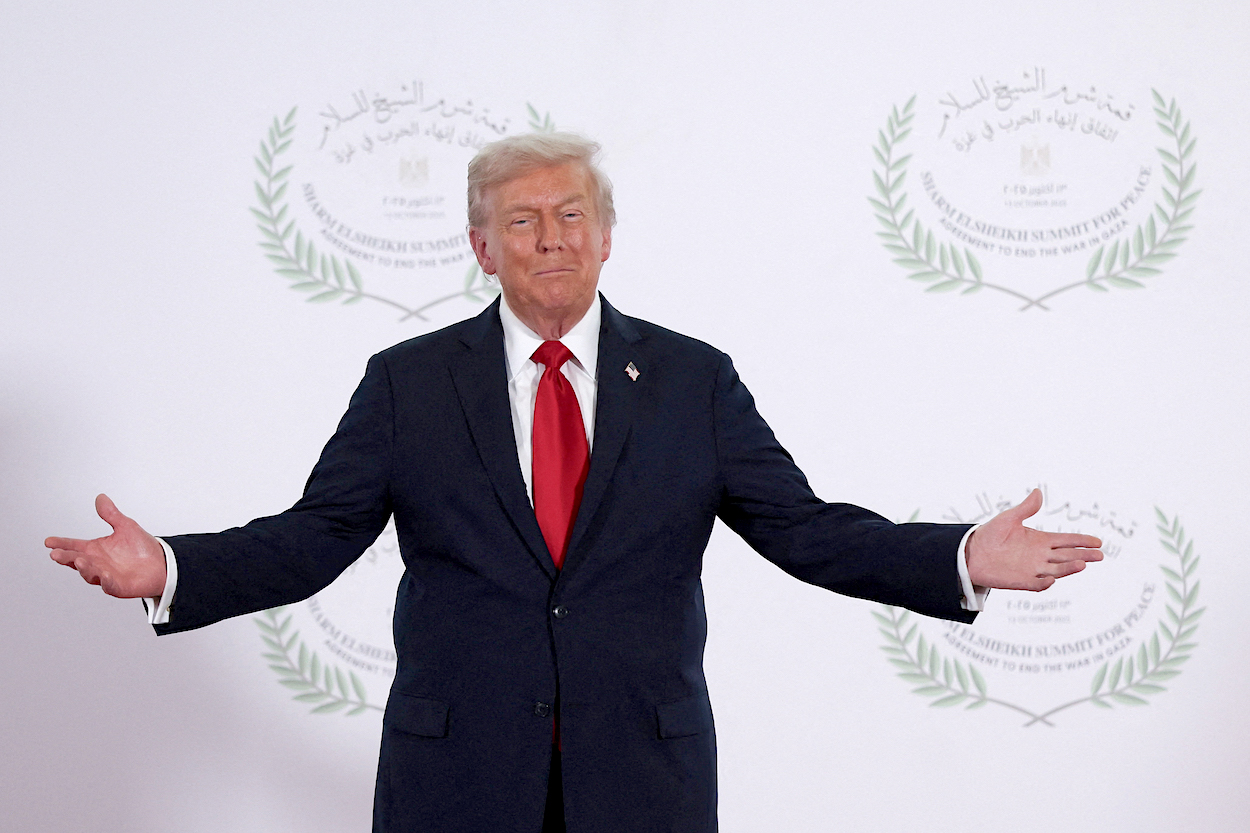Whenever Donald Trump proposes a policy that runs counter to the progressive consensus, there are three stages of response: it’ll never work, it’s a disaster, it was our idea all along.
We are at stage three on Trump’s truce in Gaza. Antony Blinken, Secretary of State in Joe Biden’s administration, says: ‘It’s good that President Trump adopted and built on the plan the Biden administration developed after months of discussion with Arab partners, Israel and the Palestinian Authority.’
It’s true that Joe Biden secured a two-month ceasefire at the start of the year and with it the release of a sizeable contingent of hostages. It’s true also that Trump’s truce is really just another ceasefire: between Israel and the Palestinians, the firing only ever ceases for so long. But Blinken’s attempt to claim credit for the latest pause in Middle East mayhem is a far cry from the scorn once heaped on the notion that Trump could succeed where Biden failed in securing a cessation of hostilities. Indeed, among his political opponents, media critics, and regional experts, the President was forecast to escalate conflict.
Eamon Kircher-Allen of the Century Foundation, a US progressive think tank specialising in the Middle East, argued in November 2024 that policymakers should ‘assume the worst’ of the incoming administration, namely that ‘the Trump presidency will be captured by aggressive Middle East hawks who will facilitate the acceleration of the Gaza genocide and the expansion of war, perhaps to Iran’.
In February 2025, Ahmed Aboudouh, an associate fellow at Chatham House, eviscerated Trump’s proposed takeover of Gaza and, even after acknowledging that it could be a negotiating tactic to pressure Hamas, concluded that the Middle East saw Trump as ‘a wrecking ball for what remains of the regional order’, who was ‘risking another four years of chaos, bloodshed and destruction’.
Last October, Uri Friedman of the Atlantic, predicted that ‘a second Trump administration’s Middle East policies would likely focus more on confronting Iran and broadening Israeli-Arab diplomatic normalisation than on resolving the Israeli-Palestinian conflict’. By contrast, the focus seems to have been on all three of those things, and while no one would seriously call the Trump truce a resolution, it has managed to solve the immediate problem of Palestinian civilians being killed. (By Israel, that is; Hamas has stepped up its killing of Palestinian civilians, but unfortunately western progressives are unavailable to march against this because they are washing their hair from now until the next IDF munition is fired in the direction of Khan Yunis.)
Centre for American Progress fellow Andrew P. Miller, who served as Biden’s deputy assistant secretary of state for Israeli-Palestinian affairs, warned readers of Foreign Affairs in June 2025 that, if the United States joined Israel’s strikes on Iran’s nuclear programme, ‘Trump will be leaving US and regional security dependent on the outcome of a reckless gamble that could draw the United States further into the Middle East and create another foreign policy debacle that haunts Americans for decades’.
I don’t quote these assessments to embarrass their authors, whom I’ve no doubt have a body of solid research, analysis and journalism. I was forced to issue more than one Middle East mea culpa during Trump’s first term, and by the end of that administration I was pointing out on Coffee House the gulf between what regional specialists warned would come of the unconventional president’s policies and what actually came of them. Instead of it was our idea all along, I went from it’ll never work to the bastard got this one right, I guess. While it’s painful to admit when those we disagree with confound our expectations, it’s essential if we wish to continue writing seriously about them. Probably good for the soul, too.
Trump’s success in getting Jerusalem and Gaza to stop painting the desert red, however long it might last, is a confronting moment – or ought to be – for the Middle East expert class. They were wrong. All of them. Wrong, wrong, wrong. Obama, Kerry, Biden, Blinken: wrong. Their senior staff: wrong. Policymakers and strategists: wrong. Diplomats and envoys: wrong. Academics and pundits: wrong. NGOs and activists: wrong.
And, somehow, the reality TV hairdo with no experience and no expertise was right. People capable of reflection would be profoundly troubled by this and would enter a period of quiet introspection. Difficult questions would be asked, old assumptions and frameworks jettisoned to avoid a repeat. Thankfully progressives are amongst the most incurious people you can encounter, so this won’t happen with them, and few will recognise that they were in error let alone wonder why. It should, however, lessen the value assigned to their analysis in the future.
Somehow, the reality TV hairdo with no experience and no expertise was right
There are lessons to learn for anyone who wishes to. The least significant are personal. When we reason from the position that a public official is mad or evil and search every policy he advocates for evidence of this hypothesis, we do a disservice to our own intelligence and that of anyone who seeks our analysis. Hatecasting – allowing personal or ideological animus to override our critical faculties – is deathly to honest, objective assessment. It leads to error and irrelevance.
The more significant lessons are institutional. No amount of education or expertise can immunise a researcher, scholar or observer from confirmation bias and the warm and fuzzy embrace of the echo chamber. Left, right or centre, platforms and institutions where most people think alike will invariably struggle to understand those who don’t. If very few or none of your policy analysts can explain why Trump’s approach to diplomacy worked, your think thank needs to hire some people who think differently.
A related problem is that the definition of think tank has expanded. There has long been a tension between pure research (if such a thing exists) and advocacy in the think tank world and in the ideological silo that is humanities and social science academia. But where blurring is sometimes unavoidable, what we see now is a more pernicious crossover in which research and analysis is put in service of hyperactivism: a loud, intemperate partisanship which scorns even-handedness and reasoned consideration and demands that it gets its way and gets it right now. That’s true of think tanks, news platforms, NGOs and plenty others. Some will simply be following the money, which should prompt benefactors to consider whether their philanthropy is actually beneficial to public debate and policymaking, while others will be driven by ideology. Either way, their model isn’t working.
If you hate Trump too much to understand him, maybe you shouldn’t be in the Trump-understanding business.









Comments